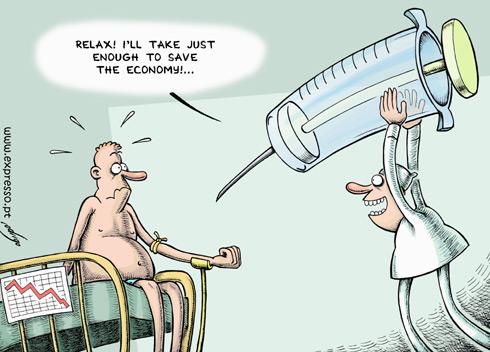
Socialist Alliance statement
The current economic crisis comes after 14 years of boom conditions, which have delivered a profits bonanza to the bosses. Workers’ share of the national income has declined from 60% in 1978 to 51% today. At the same time, the cost of living has risen significantly.
The bosses are using the global financial crisis as a cover to slash jobs. As the Australian economy heads towards recession, unemployment is rising. The official unemployment figure is predicted to rise to 9% by the end by 2010; the real level of joblessness will be far greater.
Corporate greed
Even though companies like Pacific Brands have received millions of dollars of government subsidies over the years, they are retrenching workers and devastating entire communities in the process, not because they are on the brink of collapse but because their profit margins are down! While Pacific Brands cries poor, its CEO’s pay packet was tripled to $1.89 million, which includes “incentive payments” — no doubt a reward for her success in axing jobs.
The federal Labor government has called for a united response to the financial crisis, asking government, business and unions to work together. Workers have been told that we have lived beyond our means and that now is the time to tighten our collective belts, forgoing wage claims for the sake of the nation. No demands are made on the employers however!
Billions of dollars of taxpayers’ money have been allocated to stimulate the economy. Most of this money is delivered as a handout to big business without any real guarantee to retain jobs. Workers are pressured into accepting pay cuts and shorter working hours to help employers retain their profits. In rural and regional Australia, the pressure is especially acute for workers in vulnerable industries.
Stimulus package: job losses for the poor & welfare for the rich
The federal government’s $42 billion “stimulus” package aims to soften the worst aspects of the recession through increasing public spending — but by as little as possible. Fundamentally it is designed to protect private profits. Rudd’s corporate welfare package will not protect workers; it may prevent some job losses but it won’t stop unemployment from rising sharply. At the very least, firms (like Pacific Brands) which take government subsidies should be prohibited from sacking workers.
Who is to blame & who should pay?
The bosses will attempt to force working people to bear the burden of the crisis by:
What position should unions take?In the face of the global financial crisis, the ACTU’s response has been one of retreat and essentially tails the Rudd government’s pro-business agenda by accepting its calls for wage restraint. Massively expand the public sector to create jobs on a large scaleBut, above all, unions must demand that the public sector be massively expanded. Only this can create permanent, secure, well-paid jobs on the scale we need. This is the only kind of “stimulus package” working people should fight for. For example: Tax the rich!The resources for building a better life for all do exist. Since the economic meltdown began absolutely stupendous amounts of money have been thrown at the bosses by governments, here and overseas. In the past, whenever it has been a question of improving pensions, grappling with climate change, providing free quality healthcare for all, or expanding public housing, the cry has always been that we can’t afford it. But when it’s a question of saving the hides of a gang of greedy bosses, suddenly money is no problem at all and mind-boggling amounts have been thrown to the bloodsuckers whose insatiable greed has caused the crisis. At the end of the day, the working class will be made to pay for this largesse by savage cuts to our standard of living. Socialist Alliance says: Make the employers and the rich pay! They can certainly afford it. For too long the big end of town has gotten away with paying minimal taxes on their mega profits. The current business tax rate is a paltry 30% and few firms actually pay anything like this. Restoring it to, say, its original pre-Keating government level of 50% would be a big start in delivering the resources for the necessary large-scale job-creating investments in our public infrastructure. Our tax system favours the well-off through very low tax rates, negative gearing and other concessions. The personal tax scale should be made sharply progressive to stop the rich bludging off society. The highly regressive GST, the burden of which disproportionately falls on workers and the poor, should be abolished. |

No comments:
Post a Comment